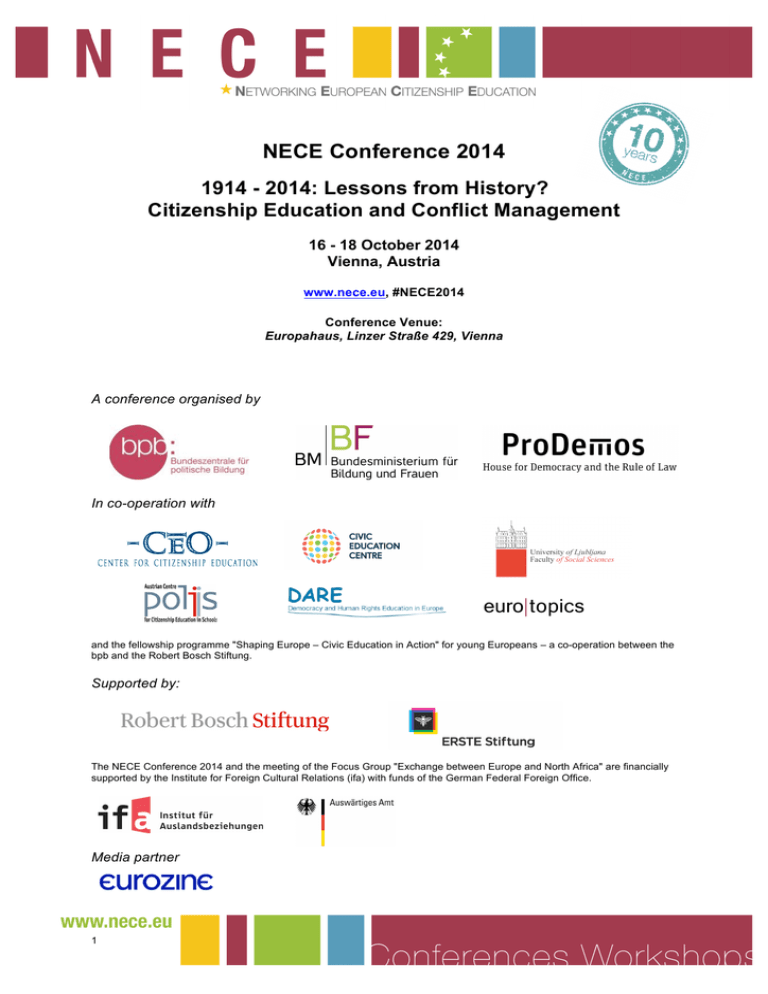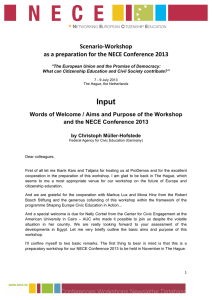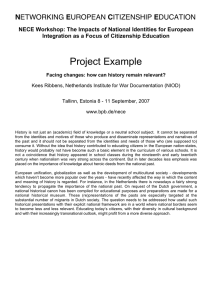NECE Conference 2014 1914 - 2014: Lessons from History?
advertisement

NECE Conference 2014 1914 - 2014: Lessons from History? Citizenship Education and Conflict Management 16 - 18 October 2014 Vienna, Austria www.nece.eu, #NECE2014 Conference Venue: Europahaus, Linzer Straße 429, Vienna A conference organised by In co-operation with and the fellowship programme "Shaping Europe – Civic Education in Action" for young Europeans – a co-operation between the bpb and the Robert Bosch Stiftung. Supported by: The NECE Conference 2014 and the meeting of the Focus Group "Exchange between Europe and North Africa" are financially supported by the Institute for Foreign Cultural Relations (ifa) with funds of the German Federal Foreign Office. Media partner 1 Background and Aims This year s NECE Conference will address challenges in Europe against the background of its history of war and conflict in the 20th century. It will ask how citizenship education can deal with the great variety of conflicts in and around Europe today. These include conflicts at Europe s periphery (Russia, Ukraine, Egypt) and the influx of refugees at the shores of the Mediterranean. Inside Europe, political and social conflicts in the wake of the economic crisis have led to a serious loss of trust into the European project. The results of the 2014 European elections have given rise to fears that the populist earthquakes in France, the United Kingdom and other countries will have an impact on the future agenda of the European Union. The implicit consensus that shaped the citizens attitude towards Europe for a long time is fundamentally called into question. Nationalistic and xenophobic resentments present a risk for Europe s democratic constitution. The economic crisis has turned into a political one. European philosophers from Hobbes to Kant have dealt with peace and war in human societies centuries ago. However, it was not until after the catastrophes of the 20th century that European elites developed a culture of constructive conflict management with the European Union as its most important institutional expression. During this period, a citizenship education focussing on human rights and democracy was developed. The variety of citizenship education formats and initiatives ideally provides citizens with opportunities for reflection and dialogue, but also for controversial debates in order to negotiate, attenuate and solve the conflicts that inevitably arise in democracies. The 2014 NECE Conference offers a platform to pursue current issues in citizenship education in Europe: Are our current patterns of thinking and discourse still appropriate for dealing with the particular challenges and crises of the European democracies today? Workshops at the conference will deal, among other aspects, with the following questions: • • • • 2 How can new arguments and methods for dealing with the populist movements in Europe be developed? Which citizenship education instruments can be utilized for managing and solving conflicts? Which role can dialogic approaches and attitudes play? Are there limits to intervention, for instance, in Ukraine or Egypt? What are the tasks of citizenship education in terms of analysing power structures and fostering the participation of citizens? How much controversy can citizenship education bear? How can we develop formats for handling conflicts, diversity and democracy as an institutionalised uncertainty (Jan-Werner M ller)? Programme Wednesday, 15 October 2014 Venue: Tagungshaus 5.30 - 8.30 pm Meeting of the NECE Focus Group Hard-to-reach learners and youth (members only) Thursday, 16 October 2014 Venue: Tagungshaus 9.30 am - 1.30 pm Meeting of the NECE Focus Group Hard-to-reach learners and youth (members only) 2.00 - 5.00 pm Meeting of the DARE Network (members only) Conference moderation: Almut Möller, DGAP e.V. (Germany) & Susanne Ulrich, Center for Applied Policy Research (C·A·P) / Academy Leadership & Competence (Germany) 2.30 pm Registration & welcome coffee 3.15 pm Welcome address Manfred Wirtitsch, Ministry of Education and Women’s Affairs (Austria) 3.30 - 4.45 pm Warming up: Dancing the waltz A waltz-dancing lesson is offered to help warming up for the conference ahead. 4.45 - 5.15 pm Coffee break & networking 3 5.15 - 6.15 pm Consultation panels & partner workshops In this session you can either participate in one of the consultation panels or alternatively in one of the offered partner workshops. 1. Consultation panels Seminar room 1 (Tagungshaus) A) “Erasmus+ for Education, Training, Youth and Sport“ Astrid Terreng, Nationalagentur (Austria) Seminar room 2 (Tagungshaus) B) “Vote Match Europe – The common tool for the 2014 European elections” Pamela Brandt, Federal Agency for Civic Education (Germany) & Jochum de Graaf, ProDemos – House for Democracy and the Rule of Law (the Netherlands) 2. Partner workshops Room Spiegel (Schloss Miller Aichholz) A) “Russia critics or Russia supporters? How Europe’s media perceive the Ukraine crisis” Judith Fiebelkorn, euro I topics (Germany) Room China (Schloss Miller Aichholz) B) “aces - Academy of Central European Schools“ Reinhard Eckert, Interkulturelles Zentrum (Austria) supported by the ERSTE Foundation (Austria) Room Europe (Schloss Miller Aichholz) C) “Turning conflicts into partnership“ Kita Boncheva, Fellowship Programme "Shaping Europe – Civic Education in Action" (Bulgaria) Room Radetzky (Schloss Miller Aichholz) D) “The genocide of the Armenians as educational challenge for dealing with history, narratives, and diversity“ Ulla Kux, The Foundation “Remembrance, Responsibility and Future“ (Germany) Room Theresien (Schloss Miller Aichholz) E) “The history and urgent assignments of civic education in the Republic of Korea“ Su-Yeon Kim, Korean Civic Education Institute for Democracy (KOCEI, South Korea) 4 Venue: Plenary room (Tagungshaus) 6.30 pm Film screening “NECE 2004 – 2014 European Citizenship Education in the making” 6.35 pm Opening address Thomas Krüger, President of the Federal Agency for Civic Education (Germany) 6.45 pm Leaving the 20th Century? Europe’s legacies in today’s world Keynote speeches “Reflections on the Commemoration Year 1914/2014” Aleida Assmann, University of Konstanz (Germany) “Past and Present: European legacies in today’s conflicts” Philipp Blom, Author (Austria) Discussion 8.30 pm Reception at restaurant/ orangery Friday, 17 October 2014 Venue: Plenary room (Tagungshaus) 9.00 am Opening address Ludwig Adamovich junior, former president of the Austrian Constitutional Court & legal advisor to the Federal President of Austria Followed by Keynote speech “Sleepwalking Giant? Europe’s political crises and its capacities as an international player” Jan-Werner Müller, Princeton University (USA) Discussion 11.30 am “Project-Pitch” session: Project market preview 12.00 - 2.00 pm Lunch break at the restaurant/ orangery 5 1.00 pm Opening of the project market – Networking and coffee break at Schloss Miller Aichholz Venue: Plenary room (Tagungshaus) 2.00 pm Introduction to the parallel workshop sessions “Conflicts in and around Europe: What should be the role of citizenship education?” Lynn Davies, University of Birmingham (United Kingdom) 2.30 pm Parallel workshop sessions: Part I Workshop 1: Exploring the power of concepts in war and peace Room Theresien (Schloss Miller Aichholz) Taking the First World War as an example, the workshop will demonstrate how concept learning can serve as an approach in citizenship education to explore the dynamics of conflicts and war. How could concepts like 'fatherland' and 'honour' contribute to war euphoria all over Europe in 1914? Would this be possible today? The members of the NECE Focus Group CLEAR (Concept Learning for Empowerment through Analysis and Reflection) will share their experiences with concept learning related to the history of the First World War and will discuss how key concepts can shed light on important societal conditions. Inputs: Claudia Lenz, The European Wergeland Centre (Norway) & Lise Kvande, Norwegian University of Science and Technology (Norway) Workshop 2: Dialogue and citizenship education: Conceptual and practical approaches Room Spiegel (Schloss Miller Aichholz) DIALOGUE is inseparably linked with the human being: our identity and social cohesion can only be generated through dialogue. It has played an important role in the development of conflict mediation methods and in peace studies for a number of decades. The potentials of this approach for citizenship education will be explained and also brought to life in a practical way in training units with the participants. Facilitator: Sigrid Peuker, Trainer and Consultant (Germany) Assistance: Mona Qaiser, Dialogue at School (Germany) Moderation: Max Behrendt, Dialogue at School (Germany) 6 Workshop 3: Conflicting identities? The role of identities in conflicts and in citizenship education Room Europe (Schloss Miller Aichholz) Identities can play a catalytic role in different conflicts. Social conflicts as well as violent clashes are not conceivable without opposing identities. Conflicts can be played out within a society or in the international context. In this workshop we are going to discuss how citizenship education needs to be designed in diversified societies. How can citizenship education generally deal with the adversarial potential of different identities in order to prevent conflict? Inputs: Lynn Davies, University of Birmingham (United Kingdom) Ulrike Niens, University of Würzburg (Germany) Moderation: Ondřej Matějka, The Institute for the study of Totalitarian Regimes/ Civic Education Center (Czech Republic) Workshop 4: The rise of populism in Europe: What should we know? How should we react? Plenary room (Tagungshaus) The recent elections of the European Parliament have demonstrated that the debates concerning European integration and membership of the EU are more polarized than ever before. Numerous euro-sceptic and populist parties have arisen, drawing on the frustration of many citizens with the economic, social and fiscal consequences of the crisis. This workshop will examine the causes of the rise of populism in Europe. In a second part of the workshop, theses will be developed on how to successfully respond to populist arguments. Inputs: Ivan Krastev, Centre for Liberal Strategies (Bulgaria) Nick Startin, University of Bath (United Kingdom) Moderation: Caroline Hornstein-Tomić, Ivo Pilar Institute of Social Sciences (Croatia) 7 Workshop 5: Conflicting ideas of Europe: The role of values in citizenship education Seminar room 2 (Tagungshaus) Democratic fundamental consensus is at stake in multiple cases. In what kind of Europe do we want to live and on what values should Europe’s future identity be based? Who has sovereignty of the interpretation of the democratic and value-based shaping of Europe’s future? Where do the current challenges lie for Europe’s democratic constitution? The focus of the workshop will be the role of citizenship education as one of the keys to the permanent reflection on Europe as a fundamental emancipatory and democratic project. Inputs: Vedran Džihić, The Austrian Institute for International Affairs (Austria) Kris Grimonprez, University of Luxembourg (Luxembourg) Moderation: Alicja Pacewicz, Center for Citizenship Education (Poland) Workshop 6: Towards a xenophobic Europe? Intolerance and racism in European societies: Responses by politics and citizenship education Seminar room 1 (Tagungshaus) Amid Europe’s economic and social crisis, a general climate of intolerance and xenophobia, an often-diffuse ‘fear of others’ appears to be spreading. How can racism and xenophobia be prevented more effectively than before and what measures are necessary in order to change the migration-hostile climate of opinion? How can the relevant arguments of populist and migration-sceptical citizens be encountered? This workshop analyses the political and economic causes of the rise of migration-hostile currents and will attempt to formulate recommendations for citizenship education to appropriately deal with racism and intolerance at the European level. Inputs: Rainer Münz, Erste Group Bank (Austria) & Hamburgisches WeltWirtschaftsInstitut (Germany) Ioannis Dimitrakopoulos, The European Fundamental Rights Agency (Austria) Moderation: Petr Čáp, Civic Education Center (Czech Republic) 8 Workshop 7: From national narratives to shared memories: Is a pan-European memory possible? Room Radetzky (Schloss Miller Aichholz) Memories and the political discourse on history and the past are a dangerous game and can disrupt not only the fabric of societies, but also spark international conflicts. How can the perspectives of ‘Others’ be incorporated into a country’s national history? Is there a European standard for dealing with ‘history’? Where does action still need to be taken? The workshop is going to develop basic hypotheses and make recommendations for further citizenship education projects. Inputs: Andrea Mork, European House of History (Belgium) Benedikt Widmaier, Haus am Maiberg - Akademie für politische und soziale Bildung (Germany) Moderation: Tomaž Pušnik, University of Ljubljana (Slovenia) Workshop 8: The role of conflicts and power structures in citizenship education Room China (Schloss Miller Aichholz) Democracy is not a legal vacuum – political power is the reflection of tense relationships between the executive power and citizens’ will, which demands active participation and co-consultation in existing power structures. This workshop elaborates on the role of conflict in concepts and practices of democracy and citizenship. It critically reflects on contexts of formal and non-formal citizenship education. Do we need to critically examine the established concepts of learning democracy in schools and the dominant discourse on democracy and political participation? The workshop presents inputs and case studies in order to spark a debate with practitioners and experts of citizenship education. Inputs: Vedrana Spajić-Vrkaš, University of Zagreb (Croatia) David Chandler, University of Westminster (UK) Bastian Küntzel, Incontro Training (Poland) Moderation: Marinko Banjac, University of Ljubljana (Slovenia) 9 Workshop 9: Enlightenment or propaganda tool? Conflicts and the role of the media Room Napoleon (Schloss Miller Aichholz) Media of all kinds can heighten, prolong or help to solve conflicts. At the same time, state and non-state players alike are spending more and more resources on controlling media and the Internet. How can citizenship educators assert themselves in this disputed field, how can they develop individual competences and impart these to citizens? Drawing on examples from selected countries, the workshop will highlight the opportunities, risks and potential instruments of citizenship education in dealing with digital and non-digital media. Inputs: Dirk Auer, balkanbiro (Serbia) Chris Burns, Friends of Europe (Belgium) Nenad Šebek, Regional Cooperation Council (Bosnia and Herzegovina) Moderation: Gemma Pörzgen, Reporters Without Borders (Germany) Workshop 10: Citizenship education in conflict regions: Challenges, options and dilemmas Hall (ground floor, Schloss Miller Aichholz) The civil war-like conflicts in Ukraine, the war in Syria and the violent escalation of the political conflicts in Egypt serve as exemplary demonstrations of intrastate conflicts turning virulent directly at the external borders of the EU. What role can citizenship education play in this alliance, in the countries concerned and in the member states of the EU? How can and should citizenship education and initiatives react to these conflicts, both in the member states of the EU itself and in the crisis-ridden countries? In this workshop, civil society representatives from Ukraine, Russia and Egypt will describe particular challenges and dilemmas they face in their work. Inputs: Nina Belyaeva, National Research University “Higher School of Economics” (HSE, Russia) Nelly Corbel, The American University in Cairo - AUC (Egypt) Ayder Khalilov, United Nations Development Programme / Project “Democracy and Human Rights in Ukraine” (Ukraine) Moderation: Louisa Slavkova, Sofia Platform - Bridging Europe and the Middle East (Bulgaria) 10 Workshop 11: Peace education and reconciliation work as twin fields of citizenship education? Room Buchwieser (Schloss Miller Aichholz) This workshop, which is organised by DARE (Democracy and Human Rights Education in Europe), will explore the interrelations of peace education and reconciliation work in Education for Democratic Citizenship (EDC). It will map the field and various approaches, formulate common aims and try to establish links between educational fields, thus contributing to a better common understanding of our aims, missions and visions for a strong civil society. Input: Borislava Daskalova, Bulgarian Network for Human Rights Education (Bulgaria) Moderation: Ragnar Müller, Gesellschaft Agora (Germany) 4.30 pm Coffee break – Project market – Networking at Schloss Miller Aichholz 5.00 - 6:30 pm Continuation of the parallel workshop sessions: Part II Evening at free disposal Saturday, 18 October 2014 Venue: Plenary room (Tagungshaus) 9.00 am World Café: Outcomes, perspectives and recommendations Three rounds of exchange on the basis of the workshop results and about framework conditions for citizenship education with the aim to contribute to conflict prevention and conflict resolution. 11.30 am Current conflicts in and around Europe and the future of European democracy Introductory statement Luuk van Middelaar, Philosopher and political advisor (the Netherlands) Followed by a discussion with Philipp Blom, Author (Austria) Ivan Krastev, Centre for Liberal Strategies (Bulgaria) Discussion with the audience and concluding remarks and Farewell by the organisers 11 1.00 pm Lunch break at restaurant/ orangery End of the conference 2.00 - 3.30 pm “Classical sightseeing tour” (optional) 2.30 pm Sight seeing tour “Vienna Protest Path” (optional) Venue: Seminar rooms 1 and 2 (Tagungshaus) 2.00 pm Meeting of the NECE Focus Groups Part I Meetings of the focus groups “Exchange between Europa and North Africa” and “CLEAR: Concept Learning for Empowerment through Analysis and Reflection“ (members only) 4.00 pm Coffee break 4.30 pm Meeting of the NECE Focus Groups Part II Meetings of the focus groups “Exchange between Europe and North Africa” and “CLEAR: Concept Learning for Empowerment through Analysis and Reflection“ (members only) 6.00 pm End of the NECE Focus Group meetings Sunday, 19 October 2014 Venue: Seminar room 1 (Tagungshaus) 9.30 am - 6.00 pm 12 Meeting of the NECE Focus Group “Exchange between Europe and North Africa” (Part III)



